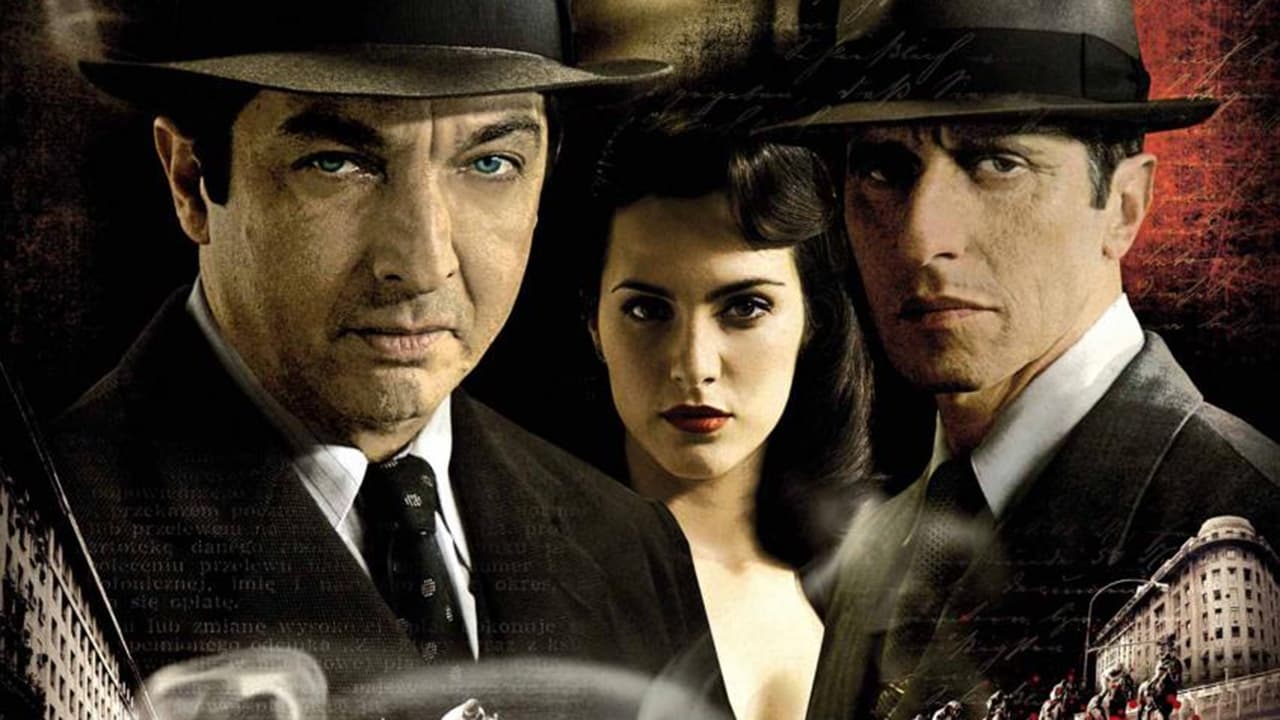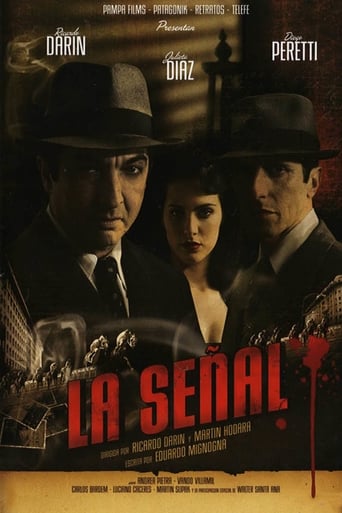

The film was still a fun one that will make you laugh and have you leaving the theater feeling like you just stole something valuable and got away with it.
... View MoreThe film creates a perfect balance between action and depth of basic needs, in the midst of an infertile atmosphere.
... View MoreIt really made me laugh, but for some moments I was tearing up because I could relate so much.
... View MoreLet me be very fair here, this is not the best movie in my opinion. But, this movie is fun, it has purpose and is very enjoyable to watch.
... View MoreIt is easy to understand why some creators are attracted to the film noir genre. After all, with its darkness, shadows, deceiving women, tough guys, and all the other elements, make for a satisfying time at the movies. "La senal", on the other hand, fails to create the allure one feels about dramas such as the one depicted in this Argentine film.The main curiosity for taking a look, was to watch Ricardo Darin, a fine cinema actor, making his debut as co-director with Martin Hodara, who worked with the late Fabian Bielinski in his two pictures. The movie was adapted, and in fact it's dedicated to, Eduardo Mignogna, in whose novel it is based. Not having read the book, we have no idea as to how close the film follows the text in which is based.Corvolan, is a sort of private eye, working with a partner, Santana, and whose work involve tailing husbands who are having extra marital affairs, and that sort of investigation. When Gloria comes to see Corvolan with a special assignment, he feels curious as to her motives, but decides to take the case. As Corvolan begins to investigate, a sort of Pandora's box opens to unmask political, as well as criminal figures involved in racketeering and extortion. Corvolan gets much more than what he expected and his liaison with Gloria will prove to be a fatal mistake on his part.It is made clear the year is 1952. The figure of a dying Eva Peron looms behind everything. There are two references in the narrative about her. It all seem superfluous to the story at hand. Mr. Darin and his co-director, have gone for atmosphere rather than substance. Mr. Darin is seen in constant close-ups that don't add much to the viewer's enjoyment; it is almost narcissistic on the part of Ricardo Darin to want to keep the camera on himself most of the time without any satisfying results. Gloria as played by Julieta Diaz doesn't have enough sensuality; she fails to convince she's a femme fatale. Only Diego Peretti, in a straight role fares better in the film.One could blame the inexperience of the star of the movie as it must have been a trying time for him to be stretching himself in front, and behind the camera. One can only wish the actor well and best luck for his next project, and perhaps allow others to direct him objectively in future appearances.
... View MoreThis is the second Argentine Noir film I see this year (along with "The Mudboy") but I think this film has been completely overrated, that leaves much to desired, argumentative but also artistically.The film is basically what we all know form a Noir film: a depressed and decadent detective which nevertheless shows great aptitude for the work; the lady in troubles, rich and mysterious that always seems to be hiding more than what she says, the always loyal and always more optimistic companion and of course "The Mafia," but what I say! If even the junior assistant who handled the car and reveals the photographs appears, well I have seen this on every film of this kind, no surprises here nor will be ahead in the movie. But then the rest of the film is a lot of confusion and turns of the plot quite clumsy, as, for example, the main character that is shown to us as a very Shrewd men and suddenly becomes nothing else but a clueless fool.I believe, however, that the worst sin is perhaps not to take the chance to portray Argentine society in those troubled years, with all that money spent in all those cars an costumes. The end is really surprising, but not because we do not expect that kind of end but, I think, because it is surprising that all ends there.I think the movie tries to show how facts from the standpoint of the main character no matter if the doubts are clear or not.But leaves you with more questions than answers and the impression that the film bite more of what could chew and in the end you keep specking what it is never going to come.Best luck next time for Darin, which by the way gave a good performance but at times it felt into the confusion of his character, Peretti was relatively well in his semi-comic sidekick, but Julieta Diaz steals the screen with a character very much in his step, no vulnerable blonds but a center-minded passionate Brunette.
... View MoreOne of Argentina's most expensive films is a really horrible one, where *NOTHING* works well. The script is extremely boring and predictable, with absolutely no turns as you'd expect in the genre (film noir) it is trying to emulate.The period reconstruction serves NO purpose to the story other than allowing a couple of characters to wear hats. They could have shot it as happening in 2007 and there would not be any difference. Peron, Eva and their politics are mentioned in passing but they play little to no role in the movie. Darin is horribly cast as the main character. His character is often referred as "The Kid", which makes you think that the character was thought and written for someone in his early eighties, and not in his late forties. It becomes hilarious at one point when a seventeen year old calls him "kid".Julieta Diaz, who is a mildly attractive and interesting woman, fails completely like the "femme fatal". She lacks the curves, sensuality, acting and good dialog that made, for example, Kim Bassinger's character in LA Confidential such a classic. Peretti starts really ridiculous with some of the most horrible lines in the film but it is the only of the title characters that manages to save face by the end.The photography is competent but nothing to write home about. There's also several shots that look badly lit and like they were done on video. The soundtrack is an extremely over the top melodic score that would fit perfectly in any soap opera and makes no sense here. For those speaking Spanish, another oddity is that all characters speak to each other too respectfully, never calling themselves by name (but by using "usted", "señor" and their last names). This is even true with those that are clearly old friends. While there's no doubt that in older times there was much more courtesy when speaking, the diction used in this movie becomes ridiculous very quickly.Finally, as far as the title of the movie (The Signal) goes.... everybody will be left wondering, as at no point it becomes clear what that signal is.
... View MoreIt looks more like Darín felt he had to make "La señal" than Darín wanted to do "La señal". Luckily, the film was not made in a rush, but this doesn't mean that it doe looks incomplete. Clearly, Darín felt moved by the project and the idea of paying tribute to the deceased Eduardo Mignona, but he could have helped in many other ways without even sitting in the director's chair. He had collaboration (Martín Hodara), but this is not the movie he had to do as his directing debut, and I'm saying it to defend him.He's said in interviews lately that he was not completely satisfied with the result, and you can tell why if you watch the film. I'm not saying don't watch it The story of two detective partners (Darín and Diego Peretti, who's starting to annoy me a bit), "La Señal" captures perfectly the period in which the work and adventures of these men take place (the 50's, time of Peron's government); it has an obscure cinematography that's interesting because it makes us want to look back at movies like France's film-noir and other classic police stories; it has a really good original score and some moments where opera music accentuates the drama immensely and it features a wonderful performance by Darín and an even better work by Julieta Díaz as a 'femme fatale'.But there are a lot of things on the downside. The script (based on Mignona's homonymous novel an credited as Mignona's but with a lot of other hands in it) is so obvious and contains things that are really out of place and bring nothing to the film; it also creates a moment of tension where the two detectives hint that something ('a sign', the English translation for the title) will change their lives. I, as a passionate viewer, started to wait for that something, for that moment; but I waited in vain because the movie never begins to flow.Besides, there's a constant depressing tone that makes the characters look as if they were in a trance. Somehow, and this is a bad thing to say, the film manages to pass this feeling on to us and, between the trance and the slow and far from credible development of the investigations, we contemplate the chance of falling asleep.This is made worse by the fact that there are not many characters and, except for some scenes, Buenos Aires looks like a completely empty city Like if the only characters that have to be in a certain place at a certain time are there; but nobody else exists.I'm sure Mignona's widow and family must be proud with the result of "La señal", but I hope that when Darín sits on the director's chair again, he chooses something better Much better.
... View More